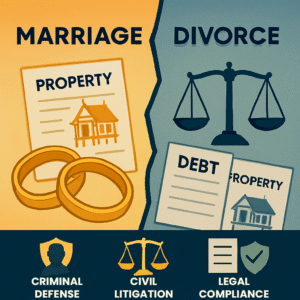- The death of one spouse automatically dissolves the marriage.
- The spouses can jointly agree to and register a divorce on mutual consent.
- If the spouses cannot agree, either spouse can file for divorce and let the court make the decision. The court will consider factors like evidence of a broken marriage and issues related to any children before granting a divorce.
Step 1 – Meet the Divorce Residency and Marriage Duration Requirements
To file for divorce in Thailand, either spouse must be a legal resident for at least six months. You must also have been married for a minimum of one year before initiating divorce proceedings in Thailand. Meeting these requirements is key.
Step 2 – Determine Appropriate Grounds for Divorce in Thailand
Thailand allows divorce on specific grounds including adultery, infliction of serious harm or abuse, desertion for over a year, or separation for three years. Consider which legal ground for divorce in Thailand applies to your marital situation and gather supporting evidence.
If you found the following grounds match your situation, you can contact us to negotiate or file a lawsuit against them.
Civil and Commercial Code – Section 1516.
Grounds of action for divorce are as follows:
- One spouse has given a maintenance to or honored such other person as wife or husband, committed adultery or had regular sexual intercourse with such other person, such other spouse may enter an action for divorce;
- One spouse is guilty of misconduct, notwithstanding whether such misconduct is a criminal offense or not, if it causes the other:
- to be seriously ashamed;
- to be insulted of hated or account of continuance of being husband or wife of the spouse having committed the misconduct;
- or to sustain excessive injury or trouble where the condition, position and cohabitation as husband and wife are taken into consideration;
the latter may enter a claim for divorce;
- One spouse has caused serious harm or torture to the body or mind of the other, or has seriously insulted the other or his or her ascendants, the latter may enter a claim for divorce;
- One spouse has deserted the other for more than one year, the latter may enter a claim for divorce;
- 4/1 one spouse had been sentenced by a final judgment of the Court and has been imprisoned for more than one year in the offense committed without any participation, consent or in the knowledge of the other, and the cohabitation as husband and wife will cause the other party sustain excessive injury or trouble, the latter may enter a claim for divorce;
- 4/2 The husband and wife voluntarily live separately because of being unable to cohabit peacefully for more than three years, or live separately for more than three years by the order of the Court, either spouse may enter a claim for divorce;
- One spouse has been adjudged to have disappeared, or as left his or her domicile or residence for more than three years and being uncertain whether he or she is living or dead;
- One spouse has failed to give proper maintenance and support to the other, or committed acts seriously adverse to the relationship of husband and wife to such an extent that the other has been in excessive trouble where the condition, position and cohabitation as husband and wife are taking into consideration, the latter may enter a claim for divorce;
- One spouse has been an insane person for more than three years continuously and such insanity is hardly curable so that the continuance of marriage cannot be expected, the other may enter a claim for divorce;
- One spouse has broken a bond of good behavior executed by him or her, the other spouse may enter a claim for divorce;
- One spouse is suffering from a communicable and dangerous disease which is incurable and may cause injury to the other, the latter may file a claim for divorce;
- One spouse has a physical disadvantage so as to be permanently unable to cohabit as husband and wife, the other may enter a claim for divorce.
Step 3 – Hire a Thai Divorce Lawyer
Consult with an experienced divorce lawyer in Thailand to initiate your paperwork and follow the proper legal divorce process. A qualified attorney can advise you on Thai divorce law and ensure your documents are legally compliant.
Step 4 – File the Divorce Petition in Thailand
Your divorce lawyer will file the divorce petition and your signed affidavit at the district office. This officially commences the divorce proceedings in the Thai court system.
Step 5 – Attempt Reconciliation of the Marriage
The Thai court requires attending reconciliation sessions to ascertain if the marital dispute can be resolved amicably without completing the divorce in Thailand. If reconciliation fails, proceed to the next phase.
Step 6 – File the Final Divorce Motion in Thailand
Your attorney files the final divorce motion detailing your legal grounds and settlement terms. The court then schedules a hearing date for the divorce case in Thailand.
Step 7 – Attend Mediation and Court Hearing for Thai Divorce
You, your spouse, and both lawyers attend mediation first. Any unsettled issues related to your Thailand divorce are then decided in the formal court hearing. In the case you have hired a lawyer, there is no need for a plaintiff or defendant to attend the court unless they will be called to be a witness on a hearing day. The lawyer could mediate or proceed with the trial in the court on your behalf.
Step 8 – Finalize the Divorce Decree in Thailand
Once approved by court, the final divorce decree legally ends the marriage in Thailand. The court issues official certificates recognizing the completion of the divorce.
Following this 8-step divorce process guide for Thailand will help you complete the proceedings smoothly. For assistance with your Thai divorce case, contact our experienced team at WSR International today.





